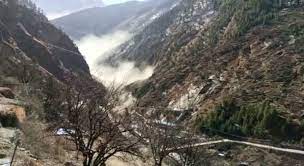Time to decide: On the Himalayan region, its carrying capacity
Infrastructure development in the hills cannot be the same as in the plains
The destruction wreaked by the floods in north India in August has evoked concern at the highest levels. Last month, a Bench headed by Chief Justice of India D.Y. Chandrachud had suggested that an expert committee conduct a “complete and comprehensive” study on the carrying capacity of the Himalayan region. Following this, the Centre has proposed setting up a 13-member technical committee. “Carrying capacity” is a concept derived from population-biology and generally refers to the quantity of a species that can thrive sustainably in a defined ecosystem. Generally, population exceeding capacity will lead to a natural decline in numbers, as witnessed when grasslands or overgrazed or invasive species throttle existing biome. Applying these ideas in the context of hill-stations and Himalayan States — the challenge is between balancing rising population, infrastructural needs and the precarious geography — is bound to be a challenging enterprise. Going by recent history, it is unlikely that a disinterested scientific opinion will be palatable to every stakeholder in the Himalayan States. Following the devastating floods in Uttarakhand in 2013, the Supreme Court had appointed a committee of experts to evaluate the role of hydropower projects in the State. While the committee’s reports did influence a reduction in the proposed hydro projects, they failed to restrict road-widening projects and the carving up of mountainsides in ways that were deemed unsuitable for the topography.
The latest proposal by the Centre is not new; as far back as 2020, it had circulated, among the 13 Himalayan States, guidelines to assess the carrying capacity of their hill stations, cities and eco-sensitive zones. The Environment Ministry had in May reminded all the States to undertake such a study and submit them “as early as possible”. The crisis of land subsidence experienced in Joshimath, Uttarakhand, in January had also sparked a debate on the conflict between infrastructural development and ecology, but in a matter of months, Himachal Pradesh saw an unexpected deluge washing away roads and highways built on denuding mountains. More committees and reports will not change the reality that infrastructure development in the hills cannot be executed as in the plains. Either States must bear the higher cost that comes from building more sustainably and minimising the risk to denizens, or designate regions as no-go zones. The latter has for decades provided fertile ground for political opportunism. As unequivocal scientific evidence concludes, the option to kick the proverbial can down the road no longer exists.
